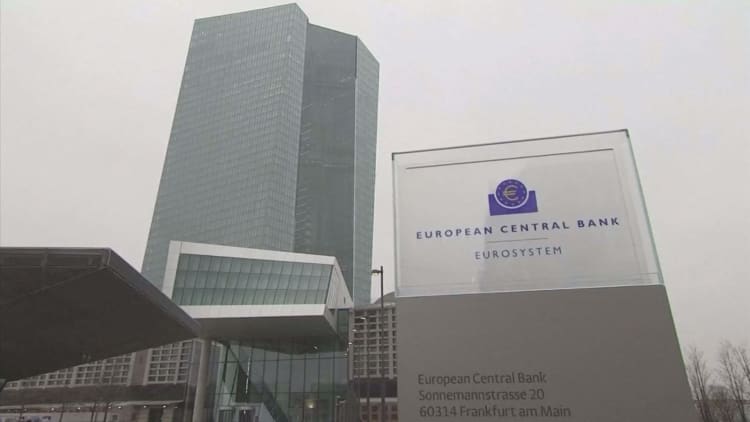
The president of the European Central Bank (ECB) has hit back at his German critics, saying that the bank's policies are working, it remained independent and that criticism of the bank could ultimately damage the euro zone's economy.
"One thing is clear: the ECB obeys the law, not the politicians. Or, as one of my predecessors put it, it is normal for politicians to comment on our actions. But it would be abnormal if we listened to them," ECB President Mario Draghi told German newspaper Bild in a translated interview published on Thursday.
He warned that any perception that the ECB's independence was "under attack can unsettle businesses and consumers" and said the criticism could be self-defeating as then investment and spending decisions could be postponed, forcing "the central bank to do more to achieve price stability."
Relations between the ECB and German policymakers have become increasingly strained over the central bank's increasingly dovish path. Criticism has been mainly leveled at Draghi, an Italian who became the head of the ECB just over four years ago, and has reached fever-pitch since the ECB brought out an even bigger "bazooka" of monetary policy measures to try to stimulate growth and inflation in the anemic euro zone.
Speculation has grown that there could be demands for the next head of the ECB to be German but Draghi said that nationality had nothing to do with the bank's policy direction.
"There is really nobody in the world who is interested in the fact that I am an Italian apart from the German media. And what difference would it make if a non-Italian were now in office? None at all. He or she would pursue the same course as we do now. All other large central banks in the world are pursuing similar policies."
No love from Germany
The main sources of criticism have been German Finance Minister Wolfgang Schaeuble who has said recently that there was "no question" that interest rates or zero for a long period of time was "not reasonable," Reuters reported.
Earlier in April, Schaeuble attacked the bank's monetary policy by saying it was causing "extraordinary problems" for Germany and was in part to blame for the rise of the right-wing anti-immigration party Alternative for Germany (AfD), Reuters reported attributing the remarks to Dow Jones.
The disapproval has been closer to home for Draghi too with Jens Weidmann, a member of the ECB's governing council and president of Germany's central bank, also saying that he was not "convinced" by the ECB's latest package of stimulus measures.
Draghi told Bild that the criticism had not got to him, however. "I don't take anything personally in my job. A polite and constructive debate is actually welcome and helps us to explain our policies," he said.
Poor savers
There is a traditional antipathy among Germany's prudent, cautious savers to low interest rates. Low rates prompt concerns that inflation could spiral out of control although the euro zone doesn't currently appear to be in danger of that, with the region in deflation territory as of the most recent March data.
Draghi said the bank was "well aware of the situation for savers" and said "it's not only in Germany that people have to face low interest rates." But he warned against raising rates too soon.
"If we raised rates now, it would be bad for the economy and it would unleash deflation, unemployment and recession. The interest on savings comes from growth, so it is in the interests of savers that inflation stabilizes and growth becomes more robust. Besides, many people benefit from low interest rates as they are also homebuyers, taxpayers, entrepreneurs and workers whose companies are benefiting."
He told Bild that "nothing" was going wrong with the ECB's policy in its inability to generate inflation in the region and said "people in Germany can rest assured that their ECB President is doing everything to restore inflation to the right level. Our mandate is price stability, which means inflation of just below 2 percent."
He also rebuffed the accusation that "cheap money" was not working. "Our policy is working, but we must be patient; investor confidence has not yet been fully restored… Meanwhile, euro area countries are now able to buy more German exports again, which, for German companies, is partly making up for the decline in trade with China. But it is a slow process because the crisis was more severe than anything we'd had since the Second World War."
On Friday, markets will have an update on the state of health of the euro zone economy with gross domestic product (GDP), inflation and unemployment data due.



